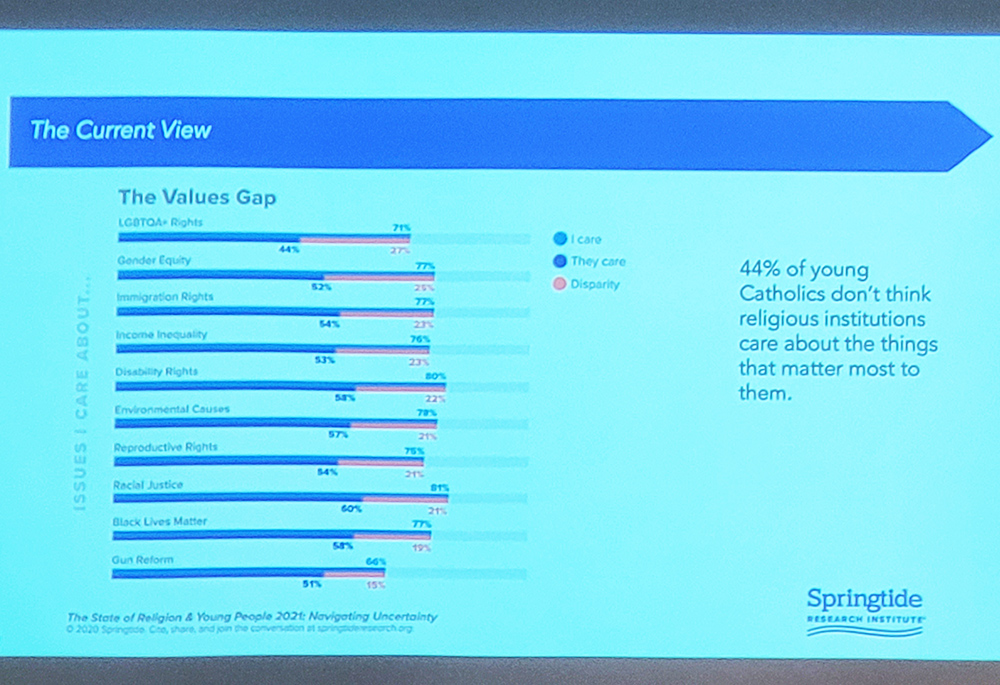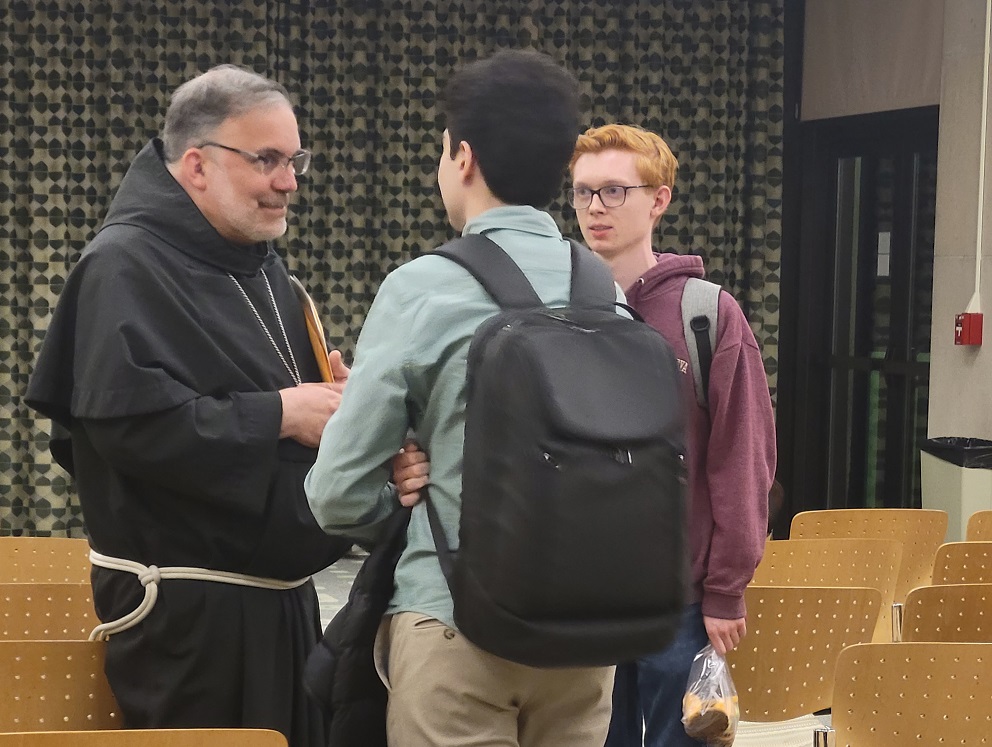
Ellen Koneck, executive director of Commonweal magazine, speaks April 14 about young people in the church at a lecture sponsored by the Catholic Common Ground Initiative and the Bernardin Center at Catholic Theological Union in Chicago. (Courtesy of Catholic Theological Union/Young Shin)
Anyone paying attention to religion in America has heard about the trend, especially among young Americans, toward disaffiliation with institutions, including the Catholic Church. So I arrived at a recent talk on "Seeking Common Ground Across Generations" prepared for dire and depressing statistics.
But I walked away with hope, thanks to speaker Ellen Koneck, executive director of Commonweal magazine, who was frank and honest but also insightful and upbeat about the future of our faith.
Her April 14 keynote, subtitled "The Context and the Concerns of Young Catholics," kicked off a weekend-long gathering co-sponsored by the Catholic Common Ground Initiative and the Bernardin Center at Catholic Theological Union.
"There is no reason to fret. The Holy Spirit is always creative," said Koneck, who is herself a millennial and formerly worked for Springtide Research Institute, which focuses on young people ages 13-25.
Koneck acknowledged what we already know about millennials and Generation Z: They don't trust institutions, skepticism is their default attitude, and they are leaving or never joining churches at higher rates than ever.

Ellen Koneck said that young people don't think the church cares about the issues that they care about and shares data from Springtide Research Institute to show the discrepancy, April 14 at a lecture sponsored by the Catholic Common Ground Initiative and the Bernardin Center at Catholic Theological Union in Chicago. (NCR photo/Heidi Schlumpf)
Yet even among the unaffiliated or "nones": 19% attend religious gatherings at least once a month; 38% say they are religious and 60% say they are at least slightly spiritual.
But even these questions about religious gatherings and "religious" and "spiritual" don't acknowledge that these and subsequent generations are "doing religion" differently, if they are doing it at all, Koneck said.
"Stats about disaffiliation are great for hand-wringing, but not that helpful for understanding young people," she said.
While religious institutions are understandably concerned about membership and attendance numbers, "membership is not a particularly meaningful metric for understanding a young person's beliefs or relationship to God or others," she said.
She also noted that concern about polarization in the church ignores the more pertinent issue of alienation among young people. In fact, polarized Catholics on the left and the right actually have much in common in that they care about the church — whereas many young people are already out the door.
"Polarization is a sign of passion, that the church is worth fighting for," she said.
When young people leave the church, "it must be received as a witness," Koneck said. "This is the work of our generation, of our generations," she said, to "roll up our sleeves" to address both polarization and alienation in the church.
During the Q&A, I followed up on Koneck's point about membership not being the metric, while noting that data about beliefs and practices also were not high for young people. If these things are not the metric, what is?
She didn't skip a beat with her answer: "Relationships."
Advertisement
Koneck's talk on Friday night followed another I had attended just three days earlier — also with a connection to the late Chicago cardinal. Bishop John Stowe of Lexington, Kentucky, spoke on "The Common Good and Synodality: The Vision of Pope Francis" as part of the Cardinal Bernardin Common Cause lecture series at the Hank Center for the Catholic Intellectual Heritage at Loyola University Chicago on April 11.
As one of the bishops who helped draft the synthesis document for the North American continental phase of the ongoing process for the Synod of Bishops, Stowe expressed concern about what he saw as "notable differences" in this phase's virtual listening sessions, compared to input from the previous parish- and diocesan-level phase.
"Concerns about the direction of the synod were more pronounced," said Stowe, noting that among the concerns of those delegates, who were handpicked by bishops, were restrictions against the pre-Vatican II Latin Mass, possible changes to Catholic doctrine, the focus on inclusivity and the synod process itself.

Bishop John Stowe of Lexington, Kentucky talks with students from Loyola University Chicago after the bishop's talk on "The Common Good and Synodality: The Vision of Pope Francis" April 11. (NCR photo/Heidi Schlumpf)
He also pointed out that the North American group, which included the United States and Canada, was the only group of the seven not to hold in-person meetings for the continental phase, instead conducting their sessions with bishops and two delegates selected by each diocesan bishop via Zoom.
"Asia, Europe and Africa with their vast geographies and cultural diversity were able to conduct continental assemblies. Even the Middle East created such an assembly," he said. "North America did not, citing economic and practical difficulties in coming together."
Yet Stowe believes Francis' revisioning of the synod process may be his most lasting contribution to the church, comparable in influence to the Second Vatican Council. "The embrace of synodality has the potential to revive and enliven the church under the guidance of the Holy Spirit, and this church will strive to lead humanity to greater fraternity and unity for our survival and hopefully our flourishing," he said.
The question remains, however, whether synodality — which is inherently an institutional process — speaks to the young people Koneck described in her talk? The key, as she noted, is relationships.





